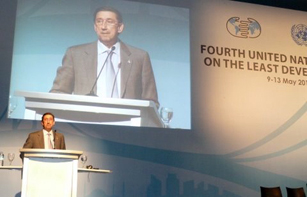
Feature Story
Fourth United Nations Conference on the Least Developed Countries hosts high level debate on gender equality and empowerment of women
16 May 2011
16 May 2011 16 May 2011
Dr Paul DeLay, UNAIDS Deputy Executive Director, Programme
Credit: UNAIDS
The fourth United Nations Conference on the Least Developed Countries (LDC-IV) ran 9-13 May in Istanbul, Turkey. Member states met to discuss objectives and targets for the next decade 2011-2021.
According to Mithat Rende, coordinator for the LDC-IV, "There are 48 least developed countries in the world with a population of 950 million.” These countries account for 12% of the world’s population and an estimated half of people in these countries live in conditions of extreme poverty.
To place gender equality and the empowerment of women at the centre of discussions on human and social development, a high level interactive debate was held on 12 May.
The debate, which brought together leaders in the field of governance, development and United Nations bodies, was co-chaired by Peter Shanel Agovaka, Minister of Foreign Affairs & External Trade, Solomon Islands and Steven Vanackere, Vice-Prime Minister and Minister of Foreign Affairs, Belgium.
UNAIDS Deputy Executive Director, Programme, Paul De Lay described how an effective and sustainable AIDS response has created solidarity and cohesion around common priority issues across the development spectrum. Addressing the underlying social and economic drivers of the epidemic and companion health, development and rights challenges helps catalyze positive social change and accelerate development. He noted, “Successes will depend on the engagement of key populations in every facet of the response.”
“Removing common barriers that unblock progress on AIDS, such as gender inequality, also advance progress on maternal and child health and universal education,” Dr De Lay said. “The AIDS response has built bridges for health, development and human rights,” he added.
Development, gender inequality, and HIV
The 2010 Human Development Report showed that the countries with low human development score highest in a Gender Inequality Index. Women in these countries have lower access to education and economic opportunities, and lack of a political voice.
Women make up around half of all people living with HIV and 76% of women living with HIV live in sub-Saharan Africa. Some 30 years since AIDS was first reported, persistent gender inequality and human rights violations continue to put women and girls at a greater risk of and vulnerability to HIV.
Removing common barriers that unblock progress on AIDS, such as gender inequality, also advance progress on maternal and child health and universal education
Dr Paul DeLay, UNAIDS Deputy Executive Director, Programme
These obstacles are hampering progress and threaten the gains that have been made in preventing new HIV infections and in increasing access to treatment. In addition to their biological susceptibility to HIV, women and girls face many interacting socio-cultural, economic and legal challenges that amplify their vulnerability.
The participants discussed the need to define concrete goals that can be evaluated by better data in order to mainstream gender and social protection in a meaningful way into development programmes. Ensuring that social protection policies are gender responsive and inclusive are seen as critical components of this agenda for future action. There was a call for smart investments in women and girls and the need to invest in young people including in their education and reproductive health.
Ensuring universal access
Earlier in the week Dr De Lay moderated a side event on Ensuring universal access to HIV prevention, treatment, care and support services: country perspectives during which he gave an overview of the history of universal access. Looking ahead to next month’s General Assembly gathering he said, “The 2011 High Level Meeting from 8–10 June will present a unique opportunity to review progress and reinvigorate the AIDS response. The time has come to reaffirm commitments against global targets.”
A keynote speech was delivered on behalf of Bathabile Olive Dlamini, South Africa’s Minister of Social Development, by Zane Dangor, Special Advisor to the Ministry, Department of Social Development. The speech presented the outcomes of the International Advisory Group on Universal Access which convened recently in Johannesburg, and discussed progress in HIV in the broader context of solidarity for human rights. He stressed that the AIDS movement has proved that human rights are not just about values and ideology: protecting human rights is a requirement for saving lives. Panelists from Tanzania, Nepal and the African Union illustrated this point with powerful experiences working with national AIDS programmes, young people, communities and families in scaling-up to universal access.



